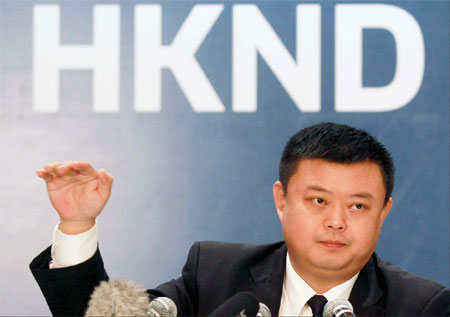Logistics project of the century
|
Eleven agreements and letters of intent have been signed between Shandong province in East China and African local governments, covering infrastructure projects, minerals and agriculture. |
Chinese company bankrolls ocean-linking channel through nicaragua that will rival the Panama canal
A project to build a 286-kilometer canal traversing Nicaragua has been initiated by a Chinese company in what could be the most significant global logistics ventures of the 21st century. It is expected to rival the Panama Canal and boost China's energy and resource imports from the Americas when it is completed in 2020.
HKND Group, an infrastructure development company in Hong Kong, will be responsible for financing the $40 billion (30.7 billion euros) project before construction begins next year.
Wang Jing, who wholly owns HKND, told a news conference in Beijing that global investors would play a role. He has also been in touch with energy companies, he said.
The new canal is expected to generate annual revenue of at least $5.5 billion when it cashes in on the increasing Chinese demand for coal and oil in the region and the shift of United States' energy policy to more exports, Wang said.
The Panama Canal has invested $5.3 billion in an expansion project since 2007, but Wang said it could not meet the growing maritime trade between the West and East.
The 286-kilometer Nicaragua Canal will be three times longer than the Panama one, and almost twice as broad and deep, allowing larger vessels to pass. It is designed for 400,000-ton-class vessels; the Panama Canal can only take vessels with capacity below 150,000 tons.
"The canal will accommodate large LNG carriers and oil tankers from the United States and Venezuela heading towards China," says Lin Boqiang, director of the China Center for Energy Economic Research at Xiamen University.
US' shale gas exports to China have little price advantage because of the high cost of getting around Cape Horn at the southernmost tip of South America, but a shortcut will definitely boost the volume, he says.
"The new canal will become a lifeline in the global energy trade," Lin says. Larger imports from the Americas are also in line with China's diversification strategy to lower dependence on the Middle East for energy resources, he says.
Wang says going through the Nicaragua Canal could save a 12,000-kilometer voyage, or two months.
"The canal will bring significant change to the global maritime trade map," he says. "There will be tailored vessels for the Nicaragua Canal, and harbors renovated for these vessels."
On June 13 Nicaragua's Congress granted HKND Group exclusive rights in developing and managing the new canal and potential projects, including port operations, free-trade zones, international airports and other infrastructure development for up to 100 years.
Wang says he was given "a lot of guarantees and a lot of benefits" by the Nicaraguan government in areas including land use and tax incentives.
There are no links between HKND Group and the Chinese government. China's Ministry of Foreign Affairs said the canal development was the "independent behavior of a company". The Ministry of Commerce warned last year of the potential risk of becoming involved in local political and territorial disputes in the Central American country.
"We're grateful for the warning from the Ministry of Commerce, which is what a responsible government should do," Wang says, adding that the original blueprint of the canal had been altered to avoid potential territorial disputes.
But Liu Hui, an expert in American studies with the Chinese Academy of Social Sciences, says investment in Latin American countries should pay close attention to legal and political risks.
Local trade unions have strongly resisted China's oil and railway investment in Venezuela, he says.
Wang acknowledges that the project has political, financing and engineering risks, but the fact that HKND Group stood out from other competitors was evidence of its thorough preparation.
HKND Group is working on the feasibility report with firms such as McKinsey & Co, Environmental Resources Management and China Railway Construction Corp, China's biggest construction firm, he says.
"Legal papers are also being formulated, and there are no risks of violation at this stage."
As a private investor, Wang's decision to invest in the colossal project has brought him a lot of attention, but he insisted that he was just a normal Chinese citizen.
Wang, 40, from Beijing, majored in traditional Chinese medicine in college.
"It's just the right timing for me to undertake the project," he says. "Other investors could also have done the same."
Wang is the largest shareholder of Beijing Xinwei Telecom Technology Co, owner of many core technologies used in China's homegrown standard for 3G mobile services. His 37 percent stake in the company is worth about $1.1 billion, according to the Bloomberg Billionaires Index.
Xinwei signed a $300-million contract last year to set up a phone network in Nicaragua, and the mutual trust established during the project paved the way for later cooperation on the canal project, he says.
Wang says he also has mining investments in two Southeast Asian countries, with 100-ton gold reserves worth about $5 billion, and investment in an aerospace company, which is expected to be a future partner in the canal project.
The $40-billion canal investment is nearly four times that of Nicaragua's annual GDP. It may also fulfill a dream of a country that has attempted to build an ocean-linking channel several times since the mid-1800s.
Wang says the canal project will create more than 40,000 local jobs, and a job-training program has already begun.
"It is no longer a pure investment; it has become a historical milestone. So I don't want it to become an international joke, nor an example of failed overseas Chinese enterprise."
weitian@chinadaily.com.cn



















